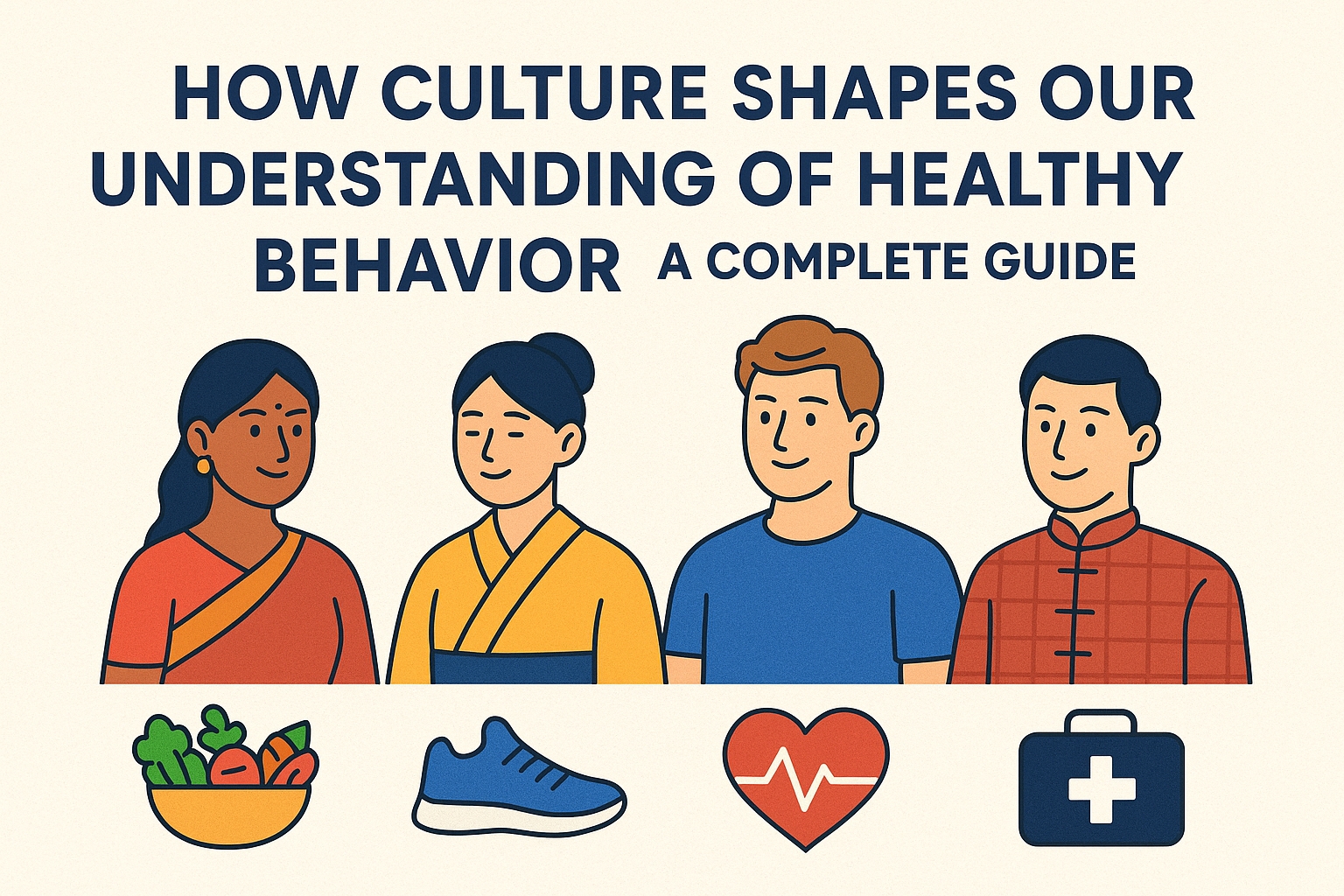How Culture Shapes Our Understanding of Healthy Behavior: A Complete Guide
Health is not just about eating right, exercising, or visiting the doctor. It is also shaped by the culture we are born into, the society we grow up in, and the values we learn from family, community, and religion.
Culture plays a powerful role in telling us what is “right,” what is “normal,” and what is “healthy.”
In this complete guide, we’ll explore how culture shapes healthy behavior, why people from different cultures follow different health practices, and how understanding cultural viewpoints can improve our personal well-being.
What Is Culture?
Culture includes:
- Beliefs
- Traditions
- Values
- Language
- Food habits
- Social rules
- Lifestyle patterns
These influence how people think, behave, and make decisions—including decisions about their health.
How Culture Influences Healthy Behavior
Culture affects health behaviors in many ways. Let’s break them down:
1. Food Habits and Diet Choices
Every culture has unique food traditions:
- Indians focus on spices, lentils, and vegetarian meals.
- Japanese meals include fish, rice, and green tea.
- Mediterranean culture emphasizes olive oil, nuts, and fresh vegetables.
These cultural diets influence:
- Digestion
- Heart health
- Immunity
- Weight
For example, the Japanese diet is associated with the longest life expectancy in the world, while Mediterranean food is known for improving heart health.
2. Physical Activity and Daily Routine
Culture determines how active people are:
- In Western countries, gym workouts are common.
- In Asian cultures, morning walks, yoga, and tai chi are part of daily life.
- Rural communities stay active through daily physical labor.
Culture shapes what we consider “exercise.”
3. Family Structure and Emotional Health
Mental health is strongly influenced by cultural values:
- Some cultures encourage open emotional expression.
- Others consider discussing feelings a sign of weakness.
- Many cultures value joint families, which provide emotional support.
- Individualistic cultures encourage independence.
These differences shape how people:
- Handle stress
- Communicate
- Seek help
- Solve problems
4. Attitudes Toward Healthcare
Cultural beliefs influence how often people visit doctors or seek treatment.
Examples:
- Some cultures trust herbal remedies more than modern medicine.
- Others rely on preventive checkups.
- Many communities use home remedies passed down for generations.
This affects how quickly people seek help and how well they recover.
5. Social Norms and Health Behavior
Culture tells us what is acceptable behavior.
For example:
- Some cultures discourage smoking and alcohol.
- Others see alcohol as part of celebration.
- Some communities promote early rising and disciplined routines.
- Others follow late-night lifestyles.
These habits influence long-term physical and mental health.
Why Different Cultures Have Different Ideas of Healthy Behavior
Because every culture has unique:
- Climate
- Historical background
- Religious beliefs
- Environment
- Social practices
For example:
- Cold countries prefer high-calorie meals for warmth.
- Tropical countries prefer light and hydrating foods.
- Cultures with strong religious traditions may avoid certain foods.
There is no single definition of healthy behavior. It changes from place to place.
Examples of Cultural Health Practices Around the World
India
- Yoga
- Ayurveda
- Eating fresh, home-cooked meals
- Spices for healing
Japan
- Eating slowly (Hara Hachi Bu)
- Minimal processed foods
- Walking daily
Mediterranean Countries
- Olive oil-based diets
- Social eating (improves emotional health)
China
- Tai Chi
- Traditional Chinese medicine
- Herbal teas
Each culture contributes valuable knowledge to healthy living.
How Understanding Culture Can Improve Your Health
Here’s how you can benefit from cultural awareness:
✔ Adopt the best health habits from different cultures
Yoga for flexibility, Mediterranean diet for heart health, Japanese eating habits for longevity.
✔ Reduce stress by respecting cultural differences
Understanding others prevents conflict and improves relationships.
✔ Improve mental health
Recognizing cultural impacts helps you understand your emotional patterns better.
✔ Build better communication skills
You become more empathetic and culturally aware.
How to Create Healthy Behavior in a Multi-Cultural World
We live in a time where people interact across cultures daily.
To build healthy habits:
- Stay open-minded
Different cultures have different priorities—learn from them. - Choose what works best for your body
Every diet or lifestyle doesn’t suit everyone. - Blend traditional and modern methods
For example, yoga + gym, Ayurveda + modern checkups. - Avoid cultural stereotypes
Healthy behavior is personal, not dictated by society alone.
Final Thoughts
Culture deeply shapes how we understand healthy behavior—what we eat, how we think, how we exercise, and how we take care of ourselves.
By learning from different cultures, we can adopt balanced, holistic, and healthier lifestyles.
Whether it’s mindfulness from Asian cultures, nutrition from Mediterranean regions, or active living from Western countries—every culture carries wisdom for better health.
Q1: How does culture influence health behavior?
Culture shapes food choices, exercise habits, emotional expression, social rules, and how often people seek medical help.
Q2: Why do different cultures have different ideas of healthy living?
Because each culture has unique climate conditions, traditions, religious beliefs, and historical influences.
Q3: What is an example of cultural health behavior?
Japan’s “Hara Hachi Bu” encourages people to eat only until 80% full, which supports weight control and longevity.
Q4: How can understanding culture improve health?
It helps you adopt better habits, reduce stress, improve relationships, and make balanced lifestyle decisions.
Q5: What cultural practices promote a healthy lifestyle?
Yoga, Mediterranean diet, tai chi, mindful eating, herbal remedies, and social-community support systems.

